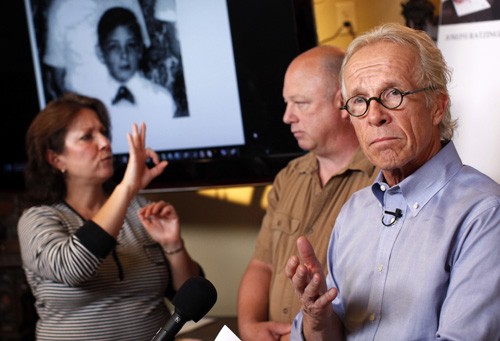MILWAUKEE — A victim of the late Rev.Lawrence Murphy, a Catholic priest accused of molesting as many as 200 deaf boys over decades, filed a lawsuit in federal court in Milwaukee Thursday naming the Holy See,Pope Benedict XVIand other top Vatican officials as defendants.
The lawsuit contends that Benedict, then CardinalJoseph Ratzinger, and top Vatican officials, including now-CardinalsTarcisio BertoneandAngelo Sodano, knew of the allegations against Murphy as early as 1995; and that the Holy See, as the supreme authority of the Catholic Church, was complicit in decisions the local bishops made about Murphy going back decades.
Evidence made public as part of the lawsuit includes two letters the victim — identified in court filings asJohn Doe16 — sent via certified mail to Sodano, then Vatican secretary of state, in 1995, saidJeff Anderson, the Minneapolis lawyer representing church victims in Milwaukee and around the country.
The lawsuit is the first of its kind to ask the court to release the names and files maintained by the Vatican of thousands of offender priests; require the Vatican to end its policy of transferring and concealing records of abusive priests in the United States; and ask the court to set up a system in which it would monitor the church’s compliance for 10 years, saidPeter Isely, Midwest director of Survivors Network of Those Abused by Priests.
The Milwaukee case is the third now pending in U.S. courts against the Vatican. Appellate courts in recent months have allowed cases in Oregon and Kentucky to proceed, and the Vatican has asked the U.S. Supreme Court to hear an appeal in the Oregon case.
The Vatican has argued that the pope is protected by sovereign immunity in the more than 170 nations that have diplomatic relations with the Holy See. But attorneys representing victims cite the 1976 Foreign Sovereign Immunities Act, which allows foreign governments and representatives to be sued in certain cases involving commercial or private activity.
The Archdiocese of Milwaukee is not named in the lawsuit. SpokesmanJerry Topczewskideclined to comment. A woman who answered the phone at the Papal Nunciature, or embassy, in New York said all questions must be put in writing and faxed to the Nuncio, Archbishop Pietro Sambi. She said she could not guarantee he would respond.
The Milwaukee Archdiocese, and local police and prosecutors, have known of the allegations against Murphy since at least the 1970s, though victims say the archdiocese knew as early as the 1950s.
Victims met separately with then Archbishop Rembert Weakland and the Milwaukee County district attorney’s office in the early to mid-1970s, seeking Murphy’s removal from the school, St. John’s School for the Deaf in St. Francis, and criminal charges.
The church initially said Murphy was too valuable to St. John’s to lose but later allowed him to resign and move to the Superior, Wis., Diocese, where his family had a home and he continued to help out in parishes and schools.
Retired District AttorneyE. Michael McCannand his then deputy,William Gardner, have maintained that the cases brought to their office were beyond the statute of limitations and not prosecutable. Victims say prosecutors knew that at least one case could be prosecuted.
Weakland wrote to Ratzinger, then head of the Congregation for the Doctrine of the Faith, in 1996 in an effort to have Murphy laicized, or removed from the priesthood.
Documents show Ratzinger’s deputy at first endorsed a canon trial and then discouraged it, citing Murphy’s age and ill health. Murphy died in 1998, just days after Weakland and the judge in the canon trial drafted letters suggesting they had or intended to halt the case. However, it was not officially dismissed until after Murphy’s death.









